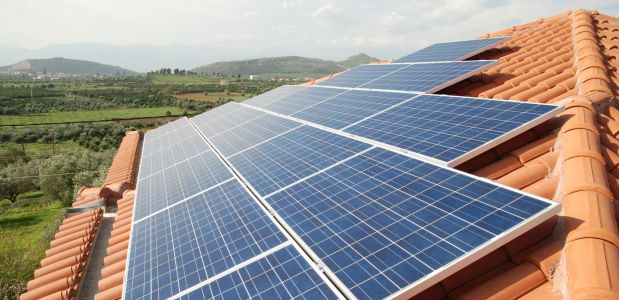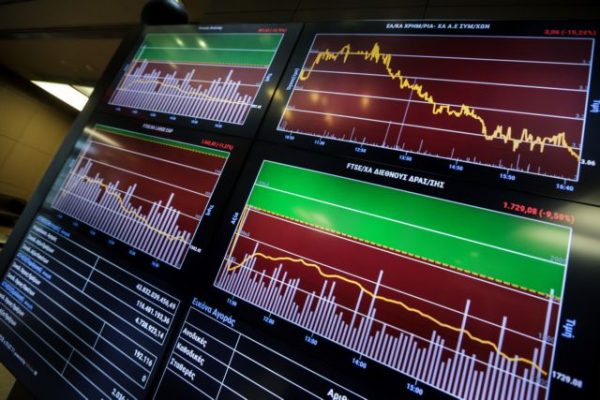
Greece registered a record in the installation of photovoltaic systems in 2022. The power of the new interconnected with the grid projects is estimated to reach 1,340 MW (megawatts) by the end of the year.
In fact, in the 9 months of January – September the solar parks had already exceeded the target set by the government, which predicted that the new interconnected projects of Renewable Energy Sources (RES) this year will reach about 2 GW (gigawatts), of which 1,040 MW photovoltaic and the rest wind. Thus, from 2010 to today, the photovoltaic plants in operation reach 5,466 MW.
In fact, according to data presented by the adviser of the Association of Photovoltaic Companies, Mr. Stelios Psomas, in the framework of the work of the “Solarplaza” organization in 2023 the installed capacity of photovoltaics will range between 7.3 and 7.8 GW, i.e. it will approach the target set by the current National Energy and Climate Plan (ESEK) for 2030, seven years before expectations. For the end of the decade, it is estimated that installed solar capacity will range between 13.6 and 16.3 GW.
Performance is also important in net metering (offset of the energy produced by the consumer – self-producer with the energy consumed). This year, 100 MW of new capacity was installed, adding to the 90 MW of previous years. For 2023, another 300 MW is estimated to be added, with net metering capacity at the end of next year estimated to reach half a GW.
In addition, a pan-European record is recorded by Greece in the percentage of participation of solar energy in the gross consumption of electricity, which in 2021 reached 8.8%. In 2022, according to Mr. Psoma, it is expected to close with a rate of 10%, which places Greece in first place in Europe. As for the participation of photovoltaics in the total production of electricity in Greece, from the beginning of 2022 until today, it reached 14.2%.
Of particular interest is the footprint of the photovoltaic market, which is dominated by… small and medium investors. In particular, of the total pie, only 22% is occupied by large investments, i.e. projects over 1 MW (this category also includes the large 205 MW ELPE park in Kozani). The share of small domestic or commercial systems, under 10 kW (kilowatts), is also limited, which barely reaches 7%.
On the contrary, the two middle categories, i.e. the 10-250 kW and 250-1,000 kW systems reach 35% and 36% respectively. The aim is, in the coming years, to increase the large projects in order to speed up the “green” energy transition, but also the small self-producers in order to achieve energy democracy.
Latest News

Greece Defines Continental Shelf Limits and Maritime Zones in Landmark EU Document
The Maritime Spatial Planning (MSP) framework represents a comprehensive approach to spatial planning and is crucial for the successful development of a blue and circular economy

EU Praises Greece’s RRF Progress as Revised Recovery Plan Nears Completion
Athens is preparing to submit its revised “Greece 2.0” Recovery and Resilience Plan after Easter, with a slight delay from the initial timeline but with the European Commission’s approval.

Greek €200M 10Y Bond to be Issued on April 16
The 3.875% fixed-interest-rate bond matures on March 12, 2029, and will be issued in dematerialized form. According to PDMA, the goal of the re-issuance is to meet investor demand and to enhance liquidity in the secondary bond market.

German Ambassador to Greece Talks Ukraine, Rise of Far Right & Tariffs at Delphi Economic Forum X
Commenting on the political developments in his country, the German Ambassador stressed that it was clear the rapid formation of a new government was imperative, as the expectations across Europe showed.

Athens to Return Confiscated License Plates Ahead of Easter Holiday
Cases involving court orders will also be excluded from this measure.

Servicers: How More Properties Could Enter the Greek Market
Buying or renting a home is out of reach for many in Greece. Servicers propose faster processes and incentives to boost property supply and ease the housing crisis.

Greek Easter 2025: Price Hikes on Lamb, Eggs & Sweets
According to the Greek Consumers’ Institute, hosting an Easter dinner for eight now costs approximately €361.95 — an increase of €11 compared to 2024.

FM Gerapetritis Calls for Unified EU Response to Global Crises at EU Council
"Europe is navigating through unprecedented crises — wars, humanitarian disasters, climate emergencies," he stated.

Holy Week Store Hours in Greece
Retail stores across Greece are now operating on extended holiday hours for Holy Week, following their Sunday opening on April 13. The move aims to accommodate consumers ahead of Easter, but merchants remain cautious amid sluggish market activity.

Green Getaway Ideas for Easter 2025 in Greece
Celebrate Easter 2025 in Greece the sustainable way with eco-farms, car-free islands, and family-friendly getaways rooted in nature and tradition.









































 Αριθμός Πιστοποίησης
Αριθμός Πιστοποίησης